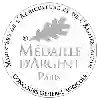
Château CoufranHaut-Médoc
This wine is a blend of 5 varietals which are the Cabernet franc, the Cabernet-Sauvignon, the Malbec, the Petit Verdot and the Merlot.
This wine generally goes well with poultry, beef or game (deer, venison).
Food and wine pairings with Haut-Médoc
Pairings that work perfectly with Haut-Médoc
Original food and wine pairings with Haut-Médoc
The Haut-Médoc of Château Coufran matches generally quite well with dishes of beef, lamb or game (deer, venison) such as recipes of roast beef casserole, lamb curry with coconut milk or duck stew.
Details and technical informations about Château Coufran's Haut-Médoc.
Discover the grape variety: Cabernet franc
Cabernet Franc is one of the oldest red grape varieties in Bordeaux. The Libourne region is its terroir where it develops best. The terroirs of Saint-Emilion and Fronsac allow it to mature and develop its best range of aromas. It is also the majority in many blends. The very famous Château Cheval Blanc, for example, uses 60% Cabernet Franc. The wines produced with Cabernet Franc are medium in colour with fine tannins and subtle aromas of small red fruits and spices. When blended with Merlot and Cabernet Sauvignon, it brings complexity and a bouquet of aromas to the wine. It produces fruity wines that can be drunk quite quickly, but whose great vintages can be kept for a long time. It is an earlier grape variety than Cabernet Sauvignon, which means that it is planted as far north as the Loire Valley. In Anjou, it is also used to make sweet rosé wines. Cabernet Franc is now used in some twenty countries in Europe and throughout the world.
Last vintages of this wine
The best vintages of Haut-Médoc from Château Coufran are 1994, 1989, 1986, 1982 and 1998.
Informations about the Château Coufran
The Château Coufran is one of of the world's greatest estates. It offers 3 wines for sale in the of Haut-Médoc to come and discover on site or to buy online.
The wine region of Haut-Médoc
The wine region of Haut-Médoc is located in the region of Médoc of Bordeaux of France. Wineries and vineyards like the Château Lestage Simon or the Château La Lagune produce mainly wines red, white and pink. The most planted grape varieties in the region of Haut-Médoc are Cabernet-Sauvignon, Merlot and Cabernet franc, they are then used in wines in blends or as a single variety. On the nose of Haut-Médoc often reveals types of flavors of leather, sour cherry or almonds and sometimes also flavors of chalk, hay or orange.
The wine region of Bordeaux
Bordeaux, in southwestern France, is one of the most famous, prestigious and prolific wine regions in the world. The majority of Bordeaux wines (nearly 90% of the production Volume) are the Dry, medium and Full-bodied red Bordeaux blends for which it is famous. The finest (and most expensive) are the wines of the great châteaux of Haut-Médoc and the right bank appellations of Saint-Émilion and Pomerol. The former focuses (at the highest level) on Cabernet Sauvignon, the latter on Merlot.
The word of the wine: Dish
Wine lacking tone and relief in the mouth.








